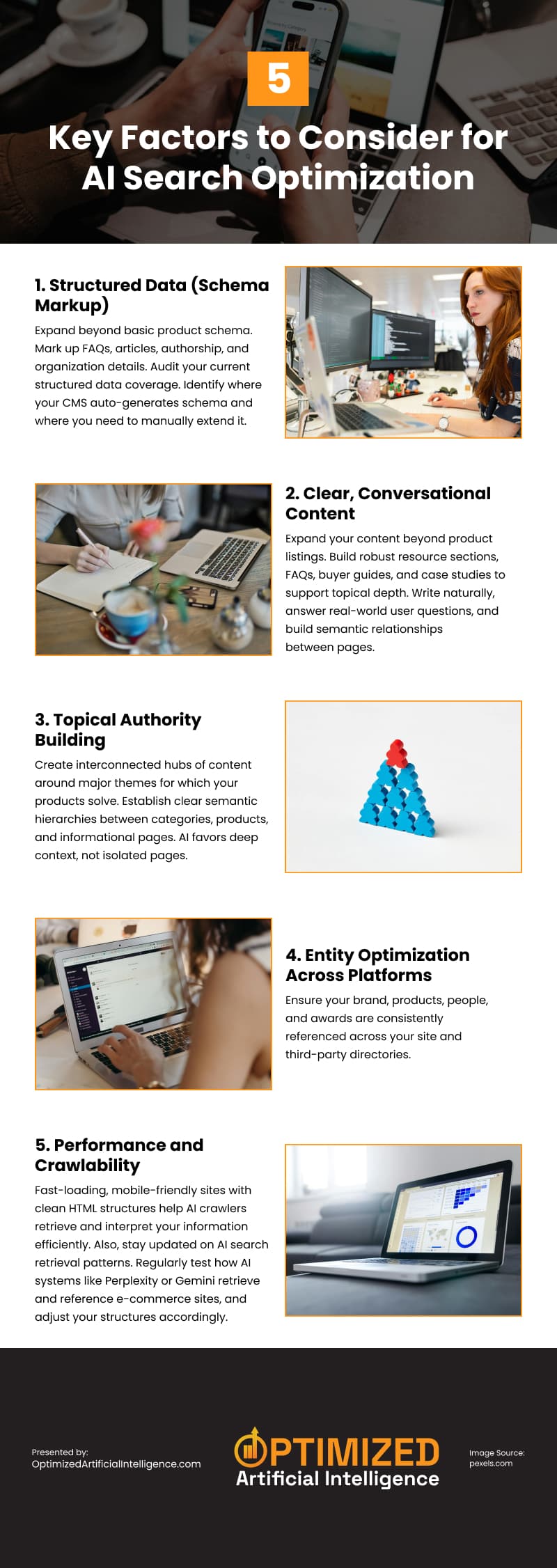You already know that search engine optimization (SEO) is critical for e-commerce success. But in the age of AI-driven search, the platform you choose—whether Shopify, WooCommerce, BigCommerce, or Magento—can enhance or hinder your ability to surface in AI-generated answers and contextual search results.
Each e-commerce content management system (CMS) comes with its own quirks regarding structured data, content flexibility, retrieval compatibility, and semantic optimization. If you want your products and brand to thrive in the world of Perplexity, Gemini, and Google AI Overview, you must understand how to work with and around your platform’s limitations.
Or skip all this and hire an experienced e-commerce AI SEO agency to handle it all for you.

(hookle.app/unsplash)
Why CMS Differences Matter More in the AI Search Era
Traditional search engines crawled your pages, indexed text, and matched keywords. But AI-powered search tools now synthesize answers based on structured information, content depth, semantic context, and real-world user signals.
You’re at a disadvantage if your e-commerce CMS restricts your ability to apply rich schema, optimize internal linking, update metadata freely, or create deep content hubs. AI models like ChatGPT browsing and Google’s SGE prefer machine-readable, semantically organized, and entity-rich sites.
Even if you offer the best products at the best prices, if your CMS doesn’t help you serve that information cleanly and contextually to AI retrieval systems, you risk being left out of key buying conversations.
What Are Common E-Commerce CMS Platforms and Their AI SEO Quirks?
Each major e-commerce CMS handles AI search optimization differently. Understanding these quirks helps you tailor your strategy for maximum visibility.
Shopify
Shopify is incredibly user-friendly but restrictive when it comes to SEO customization at a technical level.
Schema Limitations
Shopify themes often generate basic product schema automatically, but fine-tuning article, FAQPage, or Organization schema requires manual Liquid edits or apps.
Duplicate Content Risks
Shopify’s default structure can create duplicate product URLs (e.g., collections vs. individual product paths), confusing AI models during semantic indexing.
Limited Blog Authority Building
Shopify’s native blog functionality is weaker compared to platforms like WordPress/WooCommerce, making it harder to build robust topic clusters that AI favors.
Pro Shopify AI SEO Agency Tip: If you’re on Shopify, invest in custom schema apps and focus on tightly curating your blog structure to build topical authority outside of your product pages.
WooCommerce
WooCommerce, built on WordPress, offers maximum flexibility but requires technical discipline.
Schema Customization Freedom
You can easily implement complex schema for products, FAQs, articles, and authorship, which are essential for AI retrieval.
Content Ecosystem Potential
WordPress’s native blogging and site architecture features help you build deep topical authority clusters, which AI systems recognize and reward.
Risk of Overcomplication
If plugins conflict or bloated themes slow down your site, it can hurt AI crawlability and retrieval efficiency.
Pro Woocommerce AI SEO Agency Tip: Focus on clean, semantic site architecture and regularly audit plugin impact on schema consistency and page speed.
BigCommerce
BigCommerce strikes a balance between ease of use and technical robustness, but has its quirks with structured data and flexibility.
Basic Product Schema Included
Most BigCommerce templates include product schema out of the box, but extending schema to cover FAQs, blogs, or service pages requires developer help.
Content Depth Challenges
Like Shopify, BigCommerce isn’t designed primarily for large-scale content hubs or blog-heavy SEO strategies, which limits your ability to signal topical authority to AI.
Better International SEO Support
BigCommerce handles hreflang tags and multi-currency setups more cleanly than many competitors, which can help if you’re targeting multilingual or international AI search queries.
Pro BigCommerce AI SEO Agency Tip: If you use BigCommerce, supplement your main site with a separate WordPress-powered blog or resource hub to build AI-friendly topical depth.
Magento (Adobe Commerce)
Magento offers maximum customization but requires a heavy technical investment.
Full Control Over Schema and Entities
You can customize almost every aspect of structured data and semantic markup, which is excellent for AI optimization.
High Maintenance Costs
Without consistent updates and optimization, Magento sites can become slow, bloated, and error-prone, hurting both human and AI retrievability.
Complex Site Structures
Magento’s powerful features make it easy to overcomplicate product taxonomies, leading to semantic confusion unless managed carefully.
Pro Magento AI SEO Agency Tip: Build clean product hierarchies and use developer resources to implement advanced AI-focused structured data like knowledge graphs and entity-based schemas.
5 Key Factors to Consider for AI Search Optimization
Regardless of platform, AI-driven search rewards brands that focus on clarity, context, and trust signals.
Here’s what you need to prioritize:
1. Structured Data (Schema Markup)
Expand beyond basic product schema. Mark up FAQs, articles, authorship, and organization details.
Audit your current structured data coverage. Identify where your CMS auto-generates schema and where you need to manually extend it.
2. Clear, Conversational Content
Expand your content beyond product listings. Build robust resource sections, FAQs, buyer guides, and case studies to support topical depth. Write naturally, answer real-world user questions, and build semantic relationships between pages.
3. Topical Authority Building
Create interconnected hubs of content around major themes for which your products solve. Establish clear semantic hierarchies between categories, products, and informational pages. AI favors deep context, not isolated pages.
4. Entity Optimization Across Platforms
Ensure your brand, products, people, and awards are consistently referenced across your site and third-party directories.
5. Performance and Crawlability
Fast-loading, mobile-friendly sites with clean HTML structures help AI crawlers retrieve and interpret your information efficiently.
Also, stay updated on AI search retrieval patterns. Regularly test how AI systems like Perplexity or Gemini retrieve and reference e-commerce sites, and adjust your structures accordingly.
Your CMS Matters, But Your Strategy Matters More
Your e-commerce platform sets the stage, but your search engine optimization strategy for ChatGPT, Gemini, and Perplexity directs the play. Your CMS quirks are either your advantage or your obstacle. Understanding and working with your platform’s strengths and mitigating its weaknesses will define your visibility in the next generation of search.
If you adapt your structure, enrich your content, and think like a machine (while writing for a human), you’ll ensure your brand doesn’t just survive the AI shift but dominate it.
Infographic
E-commerce SEO is changing rapidly with AI-driven search. The platform you choose can impact your visibility. AI search engines favor brands emphasizing context, clarity, and trust signals. Learn more in this infographic.

